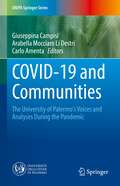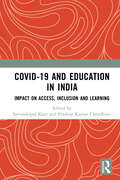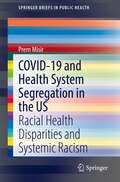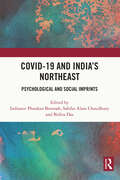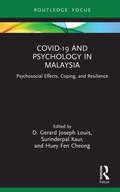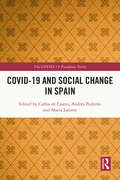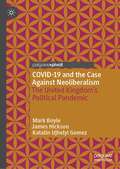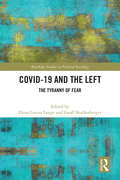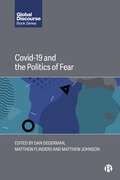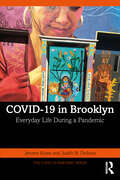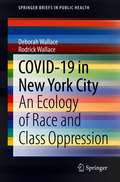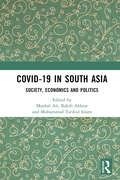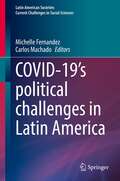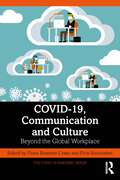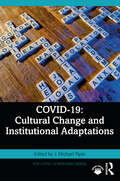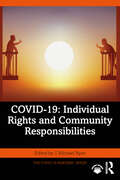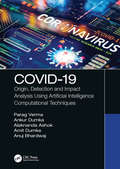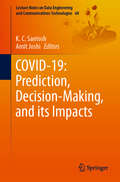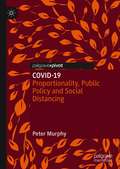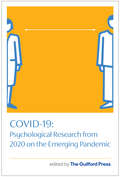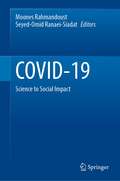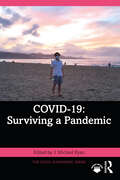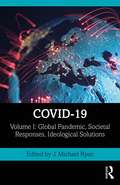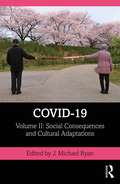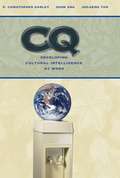- Table View
- List View
COVID-19 and Communities: The University of Palermo's Voices and Analyses During the Pandemic (UNIPA Springer Series)
by Giuseppina Campisi Arabella Mocciaro Li Destri Carlo AmentaThis volume presents an interdisciplinary reflection on the SARS-COV-2 pandemic and its consequences elaborated in real-time. It embodies the University of Palermo’s values and mission by bringing together academics of very diverse disciplinary fields on an issue that is disrupting all aspects of individual and community existence. This volume captures the voices of academics during the pandemic, allowing to crystallize the discourses that are emerging in a wide variety of scientific fields as events unfold and knowledge is rapidly evolving. They share the belief that to shed adequate light on the complex and multifaceted phenomenon of the COVID-19 pandemic and its consequences necessarily requires the adoption of an interdisciplinary approach, the consideration of a multiplicity of perspectives, and of a variety of levels of analysis. The organization of the single contributions in chapters allows the exchange of different perspectives, whilst conveying a general overall framework to the interpretation of the many facets of the changes and crisis generated by COVID-19.The volume addresses both academics and professionals dealing with the processes and the consequences brought forth by the pandemic and presents a solid example of the commitment an academic institution should devote to society and communities.
COVID-19 and Education in India: Impact on Access, Inclusion and Learning
by Satvinderpal KaurWritten from an interdisciplinary lens, this book presents a nuanced and contextual understanding of how COVID-19 (re)shapes the education sector in India, a country that got its new education policy at the peak of the pandemic to revamp and restructure its educational landscape.This volume discusses three crucial issues connecting the COVID-19 pandemic and education in India – learning and opportunity losses in the COVID-19 pandemic; access, inclusivity, and the idea of education in the online pedagogy market; and the neo-liberal agenda of education and the pandemic. It problematises the state’s response to the educational inequality crisis which the pandemic has laid bare. With both theoretical and data evidence, this book outlines the important strategies and plans needed to minimise the long-term cascading effect of the pandemic on human capital development in developing countries, and more specifically in India.Readers will find this compellingly written volume engaging and interesting as it offers new micro-level insights on the threat of the pandemic on education and outlines a few pragmatic policy options to address them. This book would be useful to students, teachers, researchers, and public policy analysts working in the field of Education, Economics, Psychology, Development Studies, Social Work, Sociology and anyone with an interest in education and development discourse, particularly in the context of crises and emergencies. It would also find a place in the reading material of policymakers, professionals and leaders from government and non-government organisations engaged in looking at education and learning inequalities.
COVID-19 and Health System Segregation in the US: Racial Health Disparities and Systemic Racism (SpringerBriefs in Public Health)
by Prem MisirThis book highlights and suggests remedies for the racial and ethnic health disparities confronting people of color amid COVID-19 in the United States. Racial and ethnic health disparities stem from social conditions, not from racial features, that are deeply grounded in systemic racism, operating through the White racial frame. Race and ethnicity are significant factors in any review of health inequity and health inequality. Hence, any realistic end to racial health disparities lies beyond the scope of the health system and health care. The book explores structuration theory, which examines the duality between agency and structure as a possibly potent pathway toward dismantling systemic racism, the White racial frame, and racialized social systems.In particular, the author examines COVID-19 with a focus on the segregated health system of the US. The US health system operates on the doctrine of ‘separate but equal’, whereby the dominant group has access to quality health care and people of color have access to a lesser quality or zero health care. ‘Separation’ implies and enforces inferiority in health care. Through the evidence presented, the author demonstrates that racial and ethnic health disparities are even worse than COVID-19. As in the past, this contagion, like other viruses, will dissipate at some point, but the disparities will persist if the US legislative and economic engines do nothing. The author also raises consciousness to demand a national commission of inquiry on the disproportionate devastation wreaked on people of color in the US amid COVID-19. COVID-19 may be the signature event and an opportunity to trigger action to end racial and ethnic health disparities. Topics covered within the chapters include:Introduction: Segregation of Health CareSystemic Racism and the White Racial FrameDismantling Systemic Racism and Structuration TheoryCOVID-19 and Health System Segregation in the US is a timely resource that should engage the academic community, economic and legislative policy makers, health system leaders, clinicians, and public policy administrators in departments of health. It also is a text that can be utilized in graduate programs in Medical Education, Global Public Health, Public Policy, Epidemiology, Race and Ethnic Relations, and Social Work.
COVID-19 and India’s Northeast: Psychological and Social Imprints
by Indranee Phookan Borooah Sabiha Alam Choudhury Bidita DasThis book explores the experiences of managing the COVID-19 pandemic in Northeast India across different areas of life and work. It offers insights into the challenges and adaptability of communities and stakeholders by including the experiences of psychologists, students, administrators, the police and children among others. The book provides an account of the turmoil—psychological, social and economic – which people endured through stories of migration, loss of livelihood, discrimination and abuse while also highlighting the outpouring of collaboration and support which was found in communities across the Northeast. This volume will be of interest to scholars and researchers of psychology, sociology, public health and administration, development studies, law and governance and South Asia studies.
COVID-19 and Psychology in Malaysia: Psychosocial Effects, Coping, and Resilience (COVID-19 in Asia)
by D. Gerard Joseph LouisPart of a mini series of Focus books on COVID-19 in Malaysia, the chapters in this book addresses the psychosocial impact on the pandemic and ways in which people have learned to develop the ability to be more resilient despite the challenges of living and working during this public health crisis. Covering a range of topics including life under lockdown, working on the frontlines, and the rapid adaptation to online teaching, the contributors highlight the pervasiveness of the pandemic on Malaysian society, identified factors that potentially increase the psychosocial impact of the pandemic on different segments of the population and how Malaysians have found ways to cope throughout this period. This is an opportunity to witness how researchers from multiple disciplines can join forces during challenging times. There are a great many lessons to be learned from the successes and failures in responding to the pandemic and the measures that have been necessary to contain it. A fascinating read for scholars with an interest in crisis management in non-Western contexts, especially those with a particular interest in Malaysia, or Southeast Asia more generally.
COVID-19 and Social Change in Spain (The COVID-19 Pandemic Series)
by Carlos De Castro Andrés Pedreño Marta LatorreOriginating in the popular Sociología en Cuarantena blog, this volume provides a detailed and multifaceted analysis of the social impact of the COVID-19 pandemic in Spain. This book originates in the great upheaval caused by the COVID-19 pandemic, when the unprecedented announcement of global lockdowns paralyszed the world and put social relations on hold. In response, a loose collective of sociologists, historians and philosophers from various Spanish universities began to share their reflections on the pandemic on the Sociología en Cuarantena blog. This book takes some of those thoughts and delves deeper into the recurring themes as they relate to the Spanish experience of the pandemic. The chapters in the first part of the book address the social and political context of the various measures put in place by the government to deal with the health, economic and social effects of the pandemic. Subsequently, several chapters examine how the pandemic led to important reflections on uncertainty and authority in processes of scientific knowledge production. Other chapters analyse the effects of the pandemic on demographics, the organization of care, the education system, the organisation of work and the recognition of essential workers, immigration policies, and the digitalization of society. Collectively, the contributions call into question the narrative of exceptionalism that views the pandemic as a singular event that is uniquely responsible for the present situation of uncertainty and instability. They also draw attention to the fragility of social prestige and trust in neglected and weakened public institutions, as well as identifying a growing socio-political polarization that may be highly significant in the future. This collection will appeal to students and researchers with an interest in contemporary Spain and the socio-political effects of the COVID-19 pandemic.
COVID-19 and the Case Against Neoliberalism: The United Kingdom’s Political Pandemic
by Mark Boyle James Hickson Katalin Ujhelyi GomezThis book seeks to better understand the meaning and implications of the UKs calamitous encounter with the COVID-19 global pandemic for the future of British neoliberalism. Construing COVID-19 as a political pandemic and mobilising a novel applied political philosophy approach, the authors cultivate fresh intellectual resources, both analytical and normative, to better understand why the UK failed the COVID-19 test and how it might ‘fail forward’ so as to strengthen its resilience. COVID-19 they argue, has intercepted the UK government’s decades-long experimentation with neoliberalism at what appears to be a threshold moment in this model’s life course. Neoliberalism has served as a key progenitor of the country’s vulnerability: the pandemic has cruelly unveiled the failings of neoliberal logics and legacies which have placed the country at elevated risk and hampered its response. The pandemic in turn has attenuated underlying systemic maladies inherent in British neoliberalism and served as a great disruptor and potential accelerant of history; a consequential episode in the tumultuous life of this politico-economic model. To meaningfully ‘build back better’, a true renaissance of social democracy is needed. Drawing upon the neorepublican tradition of political philosophy, the authors confront neoliberalism’s hegemonic but parochial concept of human freedom as non-interference and place the neorepublican idea of freedom as non-domination in the service of building a new UK social contract. This book will be of interest to political philosophers, political geographers, medical sociologists, public-health scholars, and epidemiologists, to stakeholders engaged in the public inquiry processes now gathering momentum globally and to architects of build back better programmes, especially in western advanced capitalist economies.
COVID-19 and the Left: The Tyranny of Fear (Routledge Studies in Political Sociology)
by Elena Louisa Lange Geoff ShullenbergerThe COVID-19 pandemic and the measures introduced to purportedly contain its spread have wrought an unprecedented global social transformation.Authoritarian measures such as lockdowns, vaccine mandates, and the enforced wearing of facemasks, have led to a biopolitical disenfranchisement of human rights and the encroachment of state and corporate directives onto private lives. By supporting these measures, the left has lost sight of its traditional critique of capital, the state, and class society and has instead reinforced existing power structures in the name of ‘saving lives’. In doing so, the left has contributed to widespread suffering, especially among the ‘vulnerable’ groups in society the measures claimed to protect, particularly children, the elderly, and the poor.COVID-19 and the Left explores why the left has departed from its self-understanding as a critical force against state power, unfettered capital accumulation, the digital transformation, biopolitics, and a politics of social discrimination, and instead has largely assumed a stance in line with the neoliberal consensus. In particular, the essays in this collection explore the role of fear, panic, and psychological blackmailing as a tool of domination in late capitalist society and consider whether the left has been a victim, or an active perpetrator, of a ‘tyranny of fear’.Drawing upon approaches from various disciplines and interrogating shibboleths on the left and right, the essays in this volume consider the ideological, sociocultural, and economic implications of the historical rupture that the COVID-19 pandemic presents and instead argue for a counter-narrative to fear and its harmful consequences. This provocative collection will be of considerable interest to those with an interest in the contemporary left and the impact of the COVID-19 pandemic.
COVID-19 and the Politics of Fear (Global Discourse)
by Dan Degerman, Matthew Flinders and Matthew JohnsonThe COVID-19 pandemic thrust fear into the heart of political debate and policy making. In the wake of the pandemic, it is critical to clarify the role of fear in these processes to avoid repeating past mistakes and to learn crucial lessons for future crises. This book draws on case studies from across the world, including the UK, Turkey, Brazil and the US, to provide thought-provoking and practical insights into how fear and related emotions can shape politics under extraordinary and ordinary circumstances. Offering interdisciplinary perspectives from leading and emerging scholars in politics, philosophy, sociology and anthropology, the book enables a better understanding of post-pandemic politics for students, researchers and policy makers alike.
COVID-19 in Brooklyn: Everyday Life During a Pandemic (The COVID-19 Pandemic Series)
by Jerome Krase Judith N. DeSenaCOVID-19 in Brooklyn: Everyday Life During a Pandemic looks closely at the ways that the COVID-19 pandemic impacted the lives of ordinary people living in the super-gentrified Brooklyn neighborhoods of Park Slope and Greenpoint/Williamsburg, where the authors hunkered down during the 2020 lockdown. Putting their private lives into broader scientific and public contexts, Krase and DeSena discuss a wide range of research methods and theories, as well as print and internet media sources about the pandemic. With words and images, the scholar-activist authors place their own personal experiences and those of their family and neighbors inside the broader context of global and national medical emergencies, as well as related economic, social, and political unrest, such as widespread unemployment, the Black Lives Matter Movement, and the contentious 2020 presidential election. Using a distributive social justice perspective and examining their own privileges, they discover and discuss the racial and economic inequities that affected the lives of other Brooklynites. These disparities included public health measures and lack of access to basic necessities of urban living. The book also addresses the cultural and economic shifts that took place at the start of the pandemic and contemplate how those forces will impact on future urban life, asking what the "new normal" of business, entertainment, education, housing, and work will look like locally and globally. This richly illustrated book offers an invaluable local study of the impact of the pandemic on ordinary people in Brooklyn. As such, it will be of great interest to students and researchers in the humanities and social sciences.
COVID-19 in New York City: An Ecology of Race and Class Oppression (SpringerBriefs in Public Health)
by Rodrick Wallace Deborah WallaceThis book is the first social epidemiological study of COVID-19 spread in New York City (NYC), the primary epicenter of the United States. New York City spread COVID-19 throughout the United States. The context of epicenter formation determined the rapid, extreme rise of NYC case and mortality rates. Decades of public policies destructive of poor neighborhoods of color heavily determined the spread within the City. Premature mortality rates revealed the "weathering" of policy-targeted communities: accelerated aging due to chronic stress. COVID attacks the elderly more severely than those under the age of 60. Communities with high proportions of prematurely aged residents proved fertile ground for COVID illness and mortality. The very public policies that created swaths of white wealth across much of Manhattan and parts of Brooklyn destroyed the human diversity needed to ride out crises. Topics covered within the chapters include: Premature Death Rate Geography in New York City: Implications for COVID-19 NYC COVID Markers at the ZIP Code Level Prospero's New Castles: COVID Infection and Premature Mortality in the NY Metro Region Pandemic Firefighting vs. Pandemic Fire Prevention Conclusion: Scales of Time in Disasters An exemplary study in health disparities, COVID-19 in New York City: An Ecology of Race and Class Oppression is essential reading for social epidemiologists, public health researchers of health disparities, those in public service tasked with addressing these problems, and infectious disease scientists who focus on spread in human populations of new zoonotic diseases. The brief also should appeal to students in these fields, civil rights scholars, science writers, medical anthropologists and sociologists, medical and public health historians, public health economists, and public policy scientists.
COVID-19 in South Asia: Society, Economics and Politics
by Mohammad Tarikul Islam Manhal Ali Rakib AkhtarThis book studies the impact of COVID-19 in South Asia. With case studies from India, Bangladesh, and Pakistan, the volume assesses the long-term effects of COVID on the countries’ political economy, public health, education, and society and offers recommendations for creating a more robust and resilient society for South Asian countries in response to the threat of future pandemics. The authors also make suggestions for shared policy goals, identifying smart strategies, and aligning policy instruments into short and long-term policy decisions to address wider societal issues of economy, migration, refugees, and averting the threats of extremism.Topical and comprehensive, this book will be indispensable for scholars and researchers of sociology, medical sociology, political sociology, social anthropology, South Asian studies, public policy, political economy, and political studies.
COVID-19's political challenges in Latin America (Latin American Societies)
by Michelle Fernandez Carlos MachadoThis book analyzes how COVID-19 impacted politics and how politics shaped the response to the pandemic in Latin America, the region which has become the epicenter of the global health crisis started in China. The volume brings together studies carried out in eight countries of the region – Argentina, Brazil, Chile, Colombia, Ecuador, Mexico, Nicaragua and Uruguay – and show how the impacts and outcomes varied a lot across the region depending on the political processes under way in each country in the years preceding the pandemic and on the political responses adopted by each government to deal with the health crisis. The volume is divided into four parts, each one dedicated to a specific dimension of the relation between politics and COVID-19 in Latin America. The first part is dedicated to denialism, and presents three case studies of governments that denied the importance of the health crisis: Brazil, Mexico and Nicaragua. The second part takes Uruguay and Colombia as two opposite examples of successful and failed state action against COVID-19. The third part analyzes how social movements faced the pandemic in Brazil and Chile. Finally, the fourth part analyzes how public opinion reacted to political responses to COVID-19 in four countries: Argentina, Brazil, Ecuador and Mexico. COVID-19's Political Challenges in Latin America will be a valuable resource for political scientists, sociologists and other social scientists interested in understanding how the pandemic affected politics and how politics affected the fight against the biggest health crisis faced by humanity in the last hundred years.
COVID-19, Communication and Culture: Beyond the Global Workplace (The COVID-19 Pandemic Series)
by Fiona Rossette-CrakeThis book analyses some of the many upheavals brought about by the COVID-19 pandemic through the lens of the COVID-19–communication–culture interface, with a particular focus on the new global, virtual workplace. It brings together a pluridisciplinary and multinational team of researchers from the fields of sociology and organisational studies, discourse analysis, linguistics, communication and cultural studies, and includes testimonials from actors within the professional sector such as international managers, consultants and foreign trade advisors. The collection examines a wide range of phenomena including communication on the pandemic by public authorities, the pandemic as a discursive construct, the digital turn and its impact on communication, the role of social media, as well as national diplomacy and questions of surveillance, (bio)power and trust. Issues pertaining specifically to the workplace focus on the impact of remote work, including the challenge of building cohesive work relations and managing cultural difference, distance recruitment, the new forms of professional online communication, the future of the remote work model and questions of identity that are underpinned by the culture of professions. It aims to theoretically inform some of the enormous changes which have been brought about by the COVID-19 pandemic at multiple levels of our professional and social lives. It concludes with a virtual round-table discussion on the question of cultural difference with respect to both the pandemic itself and work practice. COVID-19, Communication and Culture: Beyond the Global Workplace will be of great interest to academics and professionals interested in the communication and discourse and the cultural impact of COVID-19.
COVID-19: Cultural Change and Institutional Adaptations (The COVID-19 Pandemic Series)
by J. Michael RyanCOVID-19: Cultural Change and Institutional Adaptations provides critical insights into the impact of the pandemic on the relationship between cultures and institutions. The scholarship presented in this volume examines such important issues as the impact on health-care workers, changes in the interaction order, linguistic access, social stigma, policing, new understandings of social class, and the role of misinformation. Brought together, these insights can help us better understand both the micro- and macrochanges that have been brought about by the pandemic. Drawing on the expertise of scholars from around the world, the work presented here represents a remarkable diversity and quality of impassioned scholarship on the impact of COVID-19 and is a timely and critical advance in knowledge related to the pandemic.
COVID-19: Individual Rights and Community Responsibilities (The COVID-19 Pandemic Series)
by J. Michael RyanCOVID-19: Individual Rights and Community Responsibilities provides critical insights into the tensions between individual rights and community responsibilities during the COVID-19 pandemic. Questions about mandates, lockdowns, priorities, and broader questions related to neighborly responsibilities and human rights have been central to debates about how to confront the pandemic. The scholarship presented in this volume adds to those debates by confronting such issues as the role of social media in spreading misinformation, mask mandates, pandemic politics, and the very ethos of what is meant by human and individual rights. Drawing on the expertise of scholars from around the world, the work presented here represents a remarkable diversity and quality of impassioned scholarship on the impact of COVID-19 and is a timely and critical advance in knowledge related to the pandemic.
COVID-19: Origin, Detection and Impact Analysis Using Artificial Intelligence Computational Techniques
by Ankur Dumka Alaknanda Ashok Parag Verma Amit Dumka Anuj BhardwajThis book highlights progress in terms of Virus Biology and Infection Detection, Prevention, and Control, along with Screening, Testing, and Detection Techniques, that will provide learners and researchers (from basic to advanced) with the most innovative computer-driven methodologies for the fight against COVID-19. In addition, this book also covers the Pre- and Post-Impact of the COVID-19 Pandemic Crisis that will definitely provide useful content for researchers to think broadly about the analytical areas affected by COVID-19. This ultimately shows different paths to the same destination to help understand the nature of the COVID-19 pandemic and how to avoid it in the future.
COVID-19: Prediction, Decision-Making, and its Impacts (Lecture Notes on Data Engineering and Communications Technologies #60)
by Amit Joshi K. C. SantoshThis book outlines artificial intelligence for COVID-19 issues that are ranging from prediction to decision-making for healthcare support in human lives. Starting with major COVID-19 issues and challenges, it takes possible AI-based solutions for multiple problems, such as early prediction, its role for public health, detection of positive cases, drug analysis, and healthcare support. It mainly employs publicly available data (population) to predict who should be tested for COVID-19, for example, radiological image data to detect COVID-19 positive cases from other similar and/or different manifestations, such as pneumonia, distributed healthcare support, and supply chains in the middle of COVID-19 pandemic. The book includes recently developed AI-driven tools and techniques, such as pattern recognition, anomaly detection, machine learning, and data analytics. It covers a wide range of audience from computer science and engineering to healthcare professionals.
COVID-19: Proportionality, Public Policy and Social Distancing
by Peter MurphyCOVID-19: Proportionality, Public Policy and Social Distance explores the social and political response to the COVID-19 pandemic. It details the sociological aspects of the spread of the virus, the role played by social distancing in virus mitigation, and the comparative effect of social proximity and distance on national anti-viral behavior. Peter Murphy discusses various public policy approaches to the pandemic and their successes and failures. In this engaging analysis, he investigates the way that contemporary societies think about risk, threat and harm, and how social mood affected the response to COVID-19.
COVID-19: Psychological Research from 2020 on the Emerging Pandemic
by The Guilford PressThis book presents a range of research on COVID-19 and mental health from the earliest days of the pandemic. It features selected 2020 articles from the Journal of Social and Clinical Psychology and Psychodynamic Psychiatry. The book explores how the pandemic affected mental health providers, their practices, and their patients. Topics include: *The effects of social distancing on social engagement. *Coping with the pandemic among people with depression and anxiety. *Whether political orientations align with coping mechanisms. *Social media use and loneliness among young adults. *How service delivery and clinical training were challenged by--and responded to--the unfolding crisis. Whether addressing the isolation of those early days or the realities of providing much-needed psychiatric care, this book highlights key findings and research directions that continue to shape our thinking about the pandemic today.
COVID-19: Science to Social Impact
by Moones Rahmandoust Seyed-Omid Ranaei-SiadatThis book highlights the overview of the COVID-19 pandemic from both the scientific and the social perspectives. The scientific part presents key facts of COVID-19, including the structure of the virus and the techniques for the diagnosis, treatment, and vaccine development against the disease, covering state-of-the-art findings and achievements worldwide. The social part is written by WHO professionals who worked on the frontier of the fight against the disease. It covers the global security situation during the pandemic, the WHO and governmental-level risk management measures, and the estimated impact that COVID-19 will eventually create on social life after it is globally controlled.
COVID-19: Surviving a Pandemic (The COVID-19 Pandemic Series)
by J. Michael RyanCOVID-19: Surviving a Pandemic provides critical insights into survival strategies employed by communities and individuals around the world during the pandemic. A central question since this pandemic began has been how to survive it. That question has applied not just to staying alive, but also to staying healthy, both physically and mentally. Survival is certainly key, but surviving, and what that means, is also critical. The scholarship included in this volume will take a closer look at what it means to survive by addressing such issues as the importance of ethnicity in vaccine uptake, the gendered and racialized impacts of the pandemic, the impact on those with disabilities, questions of food security, and what it means to grieve. Drawing on the expertise of scholars from around the world, the work presented here represents a remarkable diversity and quality of impassioned scholarship on the impact of COVID-19 and is a timely and critical advance in knowledge related to the pandemic.
COVID-19: Volume I: Global Pandemic, Societal Responses, Ideological Solutions (The COVID-19 Pandemic Series)
by J. Michael RyanThe SARS-CoV-2 virus, and the associated COVID-19 pandemic, is perhaps the greatest threat to life, and lifestyles, the world has known in more than a century. The scholarship included here provides critical insights into the ethics and ideologies, inequalities, and changed social understandings that lie at the heart of this pandemic. This volume maps out the ways in which the pandemic has impacted (most often disproportionately) societies, the successes and failures of means used to combat the virus, and the considerations and future possibilities – both positive and negative – that lie ahead. While the pandemic has brought humanity together in some noteworthy ways, it has also laid bare many of the systemic inequalities that lie at the foundation of our global society. This volume is a significant step toward better understanding these impacts. The work presented here represents a remarkable diversity and quality of impassioned scholarship and is a timely and critical advance in knowledge related to the pandemic. This volume and its companion, COVID-19: Volume II: Social Consequences and Cultural Adaptations, are the result of the collaboration of more than 50 of the leading social scientists from across five continents. The breadth and depth of the scholarship is matched only by the intellectual and global scope of the contributors themselves. The insights presented here have much to offer not just to an understanding of the ongoing world of COVID-19, but also to helping us (re-) build, and better shape, the world beyond.
COVID-19: Volume II: Social Consequences and Cultural Adaptations (The COVID-19 Pandemic Series)
by J. Michael RyanThe SARS-CoV-2 virus, and the associated COVID-19 pandemic, is perhaps the greatest threat to life, and lifestyles, the world has known in more than a century. The scholarship included here provides critical insights into the institutional responses, communal consequences, cultural adaptations, and social politics that lie at the heart of this pandemic. This volume maps out the ways in which the pandemic has impacted (most often disproportionately) societies, the successes and failures of means used to combat the virus, and the considerations and future possibilities – both positive and negative – that lie ahead. While the pandemic has brought humanity together in some noteworthy ways, it has also laid bare many of the systemic inequalities that lie at the foundation of our global society. This volume is a significant step toward better understanding these impacts. The work presented here represents a remarkable diversity and quality of impassioned scholarship and is a timely and critical advance in knowledge related to the pandemic. This volume and its companion, COVID-19: Volume I: Global Pandemic, Societal Responses, Ideological Solutions, are the result of the collaboration of more than 50 of the leading social scientists from across five continents. The breadth and depth of the scholarship is matched only by the intellectual and global scope of the contributors themselves. The insights presented here have much to offer not just to an understanding of the ongoing world of COVID-19, but also to helping us (re-) build, and better shape, the world beyond.
CQ: Developing Cultural Intelligence at Work
by P. Christopher Earley Joo-Seng Tan Soon AngCultural intelligence--or "CQ"--refers to an individual's capacity for adaptation to new cultural settings and unfamiliar social environments. This resource for those living and working in foreign countries describes techniques for developing fundamental CQ skills and applying them in the workplace. Earley (National U. of Singapore Business School) and co-authors also provide a CQ self-assessment test in the appendix. Annotation ©2006 Book News, Inc., Portland, OR (booknews.com)
